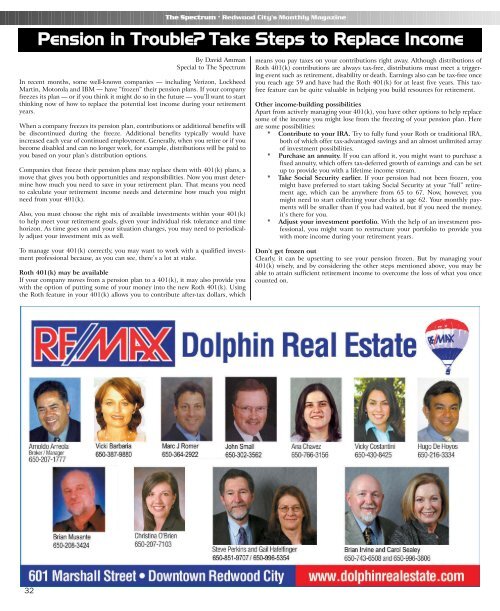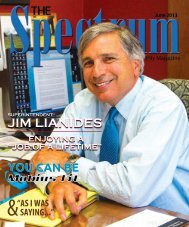CChhhuuuccckkk SSmmmiiittthh - The Spectrum Magazine ...
CChhhuuuccckkk SSmmmiiittthh - The Spectrum Magazine ...
CChhhuuuccckkk SSmmmiiittthh - The Spectrum Magazine ...
Create successful ePaper yourself
Turn your PDF publications into a flip-book with our unique Google optimized e-Paper software.
<strong>The</strong> <strong>Spectrum</strong> . Redwood City's Monthly <strong>Magazine</strong><br />
Pension in Trouble? Take Steps to Replace Income<br />
By David Amman<br />
Special to <strong>The</strong> <strong>Spectrum</strong><br />
In recent months, some well-known companies — including Verizon, Lockheed<br />
Martin, Motorola and IBM — have “frozen” their pension plans. If your company<br />
freezes its plan — or if you think it might do so in the future — you’ll want to start<br />
thinking now of how to replace the potential lost income during your retirement<br />
years.<br />
When a company freezes its pension plan, contributions or additional benefits will<br />
be discontinued during the freeze. Additional benefits typically would have<br />
increased each year of continued employment. Generally, when you retire or if you<br />
become disabled and can no longer work, for example, distributions will be paid to<br />
you based on your plan’s distribution options.<br />
Companies that freeze their pension plans may replace them with 401(k) plans, a<br />
move that gives you both opportunities and responsibilities. Now you must determine<br />
how much you need to save in your retirement plan. That means you need<br />
to calculate your retirement income needs and determine how much you might<br />
need from your 401(k).<br />
Also, you must choose the right mix of available investments within your 401(k)<br />
to help meet your retirement goals, given your individual risk tolerance and time<br />
horizon. As time goes on and your situation changes, you may need to periodically<br />
adjust your investment mix as well.<br />
To manage your 401(k) correctly, you may want to work with a qualified investment<br />
professional because, as you can see, there’s a lot at stake.<br />
Roth 401(k) may be available<br />
If your company moves from a pension plan to a 401(k), it may also provide you<br />
with the option of putting some of your money into the new Roth 401(k). Using<br />
the Roth feature in your 401(k) allows you to contribute after-tax dollars, which<br />
means you pay taxes on your contributions right away. Although distributions of<br />
Roth 401(k) contributions are always tax-free, distributions must meet a triggering<br />
event such as retirement, disability or death. Earnings also can be tax-free once<br />
you reach age 59 and have had the Roth 401(k) for at least five years. This taxfree<br />
feature can be quite valuable in helping you build resources for retirement.<br />
Other income-building possibilities<br />
Apart from actively managing your 401(k), you have other options to help replace<br />
some of the income you might lose from the freezing of your pension plan. Here<br />
are some possibilities:<br />
* Contribute to your IRA. Try to fully fund your Roth or traditional IRA,<br />
both of which offer tax-advantaged savings and an almost unlimited array<br />
of investment possibilities.<br />
* Purchase an annuity. If you can afford it, you might want to purchase a<br />
fixed annuity, which offers tax-deferred growth of earnings and can be set<br />
up to provide you with a lifetime income stream.<br />
* Take Social Security earlier. If your pension had not been frozen, you<br />
might have preferred to start taking Social Security at your “full” retirement<br />
age, which can be anywhere from 65 to 67. Now, however, you<br />
might need to start collecting your checks at age 62. Your monthly payments<br />
will be smaller than if you had waited, but if you need the money,<br />
it’s there for you.<br />
* Adjust your investment portfolio. With the help of an investment professional,<br />
you might want to restructure your portfolio to provide you<br />
with more income during your retirement years.<br />
Don’t get frozen out<br />
Clearly, it can be upsetting to see your pension frozen. But by managing your<br />
401(k) wisely, and by considering the other steps mentioned above, you may be<br />
able to attain sufficient retirement income to overcome the loss of what you once<br />
counted on.<br />
32
















